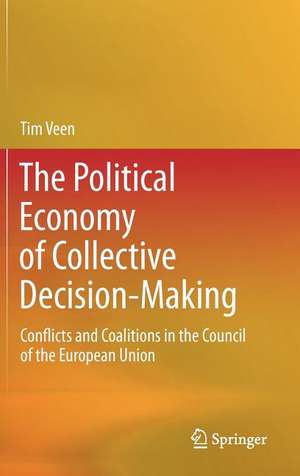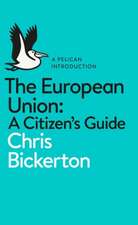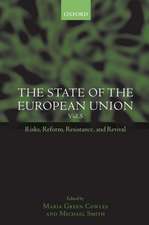The Political Economy of Collective Decision-Making: Conflicts and Coalitions in the Council of the European Union
Autor Tim Veenen Limba Engleză Hardback – 28 iul 2011
| Toate formatele și edițiile | Preț | Express |
|---|---|---|
| Paperback (1) | 554.10 lei 38-44 zile | |
| Springer Berlin, Heidelberg – 7 oct 2014 | 554.10 lei 38-44 zile | |
| Hardback (1) | 641.71 lei 6-8 săpt. | |
| Springer Berlin, Heidelberg – 28 iul 2011 | 641.71 lei 6-8 săpt. |
Preț: 641.71 lei
Preț vechi: 754.95 lei
-15% Nou
Puncte Express: 963
Preț estimativ în valută:
122.79€ • 128.53$ • 102.20£
122.79€ • 128.53$ • 102.20£
Carte tipărită la comandă
Livrare economică 01-15 aprilie
Preluare comenzi: 021 569.72.76
Specificații
ISBN-13: 9783642201738
ISBN-10: 3642201733
Pagini: 220
Ilustrații: XVIII, 199 p.
Dimensiuni: 155 x 235 x 18 mm
Greutate: 0.45 kg
Ediția:2011
Editura: Springer Berlin, Heidelberg
Colecția Springer
Locul publicării:Berlin, Heidelberg, Germany
ISBN-10: 3642201733
Pagini: 220
Ilustrații: XVIII, 199 p.
Dimensiuni: 155 x 235 x 18 mm
Greutate: 0.45 kg
Ediția:2011
Editura: Springer Berlin, Heidelberg
Colecția Springer
Locul publicării:Berlin, Heidelberg, Germany
Public țintă
ResearchCuprins
Preface.- 1 Introduction.- 2 Analysing Council Decision-Making.- 3 Power, Position and Salience.- 4 Dimensionality and Nature of Conflict.- 5 Coalitions in the Council.- 6 Winners and Losers of Decision-Making.- 7 The Council: Conflict and Coalitions.- References.
Notă biografică
Tim Veen studied International Relations & International Organization at the University of Groningen, The Netherlands. He completed this course cum laude with a Masters degree in 2007. From 2007 to 2010, he was a PhD-fellow in the Methods and Data Institute of the University of Nottingham. In 2010, he has been inferred upon honorary membership in Phi Sigma Omega, the honors society of policy scholars and worked as a policy consultant for the OECD.
Textul de pe ultima copertă
The Council of the European Union is the institutional heart of EU policy-making. But ‘who gets what, when and how’ in the Council? What are the dimensions of political conflict, and which countries form coalitions in the intense negotiations to achieve their desired policy outcomes? Focussing on collective decision-making in the Council between 1998 and 2007, this book provides a comprehensive account of these salient issues that lie at the heart of political accountability and legitimacy in the European Union. Based on a novel and unique dataset of estimates of government policy positions, salience and power in influencing deliberations, an explanatory model approximating the Nash-Bargaining solution is employed to predict the policy outcomes on ten policy domains of central importance to this institution. The book's analyses comprise investigations into the determinants of decision-making success, the architecture of the political space and the governments' coalition behavior.
Caracteristici
Constitutes the first book-length comprehensive analysis of "who gets what, when and how" in the Council Analyses a new and original data-set on decision-making in the Council Yields challenging new insights into the dimensions of conflict, coalition behaviour and winners & losers of collective decision-making Features a rigorous discussion of the various theoretical and analytical perspectives on political conflict in the Council Includes supplementary material: sn.pub/extras















